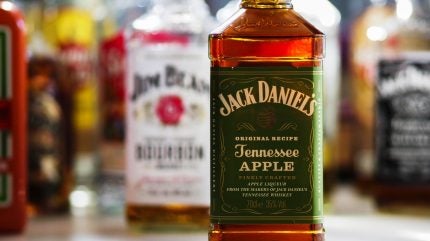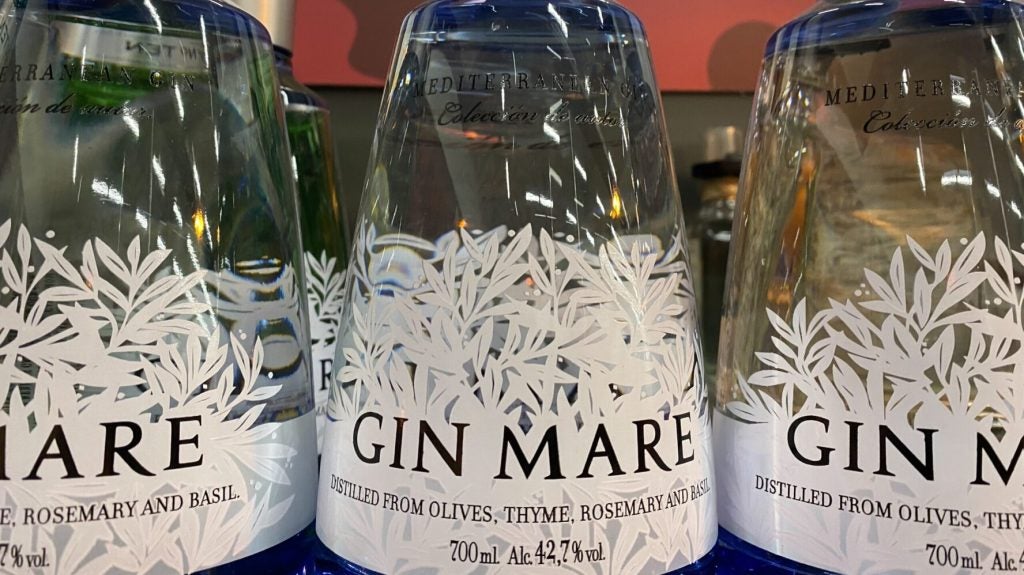
Spirits major Brown-Forman suffered a bit of a headache yesterday (5 June) after the publication of a set of financial results and projections for the company’s new fiscal year sent its shares tumbling.
The Jack Daniel’s maker saw its shares close down almost 18% in New York, at one stage falling their most in a day since 2008.

Discover B2B Marketing That Performs
Combine business intelligence and editorial excellence to reach engaged professionals across 36 leading media platforms.
Brown-Forman issued numbers for its fiscal fourth quarter (figures described by one Wall Street analyst as “painful”) and for the 12 months as a whole, while its guidance for its new financial year disappointed analysts.
“While our results did not meet our long-term growth aspirations, we made important progress in an exceptionally challenging macroeconomic environment,” Brown-Forman president and CEO Lawson Whiting said.
Brown-Forman’s Q4 numbers miss mark
As we know, Wall Street looks closely at listed companies’ quarterly results and Brown-Forman’s numbers for the three months to the end of April caused furrowed brows.
Reported net sales decreased 7% to $894m and were down 3% on an organic basis. Equity analysts covering Brown-Forman had expected the Woodford Reserve owner to eke out some top-line growth in the quarter; Bernstein had forecast a 4% rise in Q4 organic net sales. Barclays had projected a 5% increase.

US Tariffs are shifting - will you react or anticipate?
Don’t let policy changes catch you off guard. Stay proactive with real-time data and expert analysis.
By GlobalDataOperating income dropped 45% on a reported basis to $205m. Organically, the decline was less stark (down 2%) as Brown-Forman booked an impairment charge on one of its brands (more on that later). Net income was also down 45% at $146m. “Despite a distributor inventory tailwind, top-line missed in all segments except emerging [markets], with the miss flowing through the P&L,” Bernstein analyst Nadine Sarwat said.
Gin headache
The fourth-quarter figures included a $47m non-cash impairment charge for Brown-Forman’s Gin Mare brand name (it reduced Gin Mare’s contingent consideration liability by $43m, the company added).
The net sales from Gin Mare inched up 1% during the fiscal year on an organic basis, with Brown-Forman pointing to growth in France, Germany and Spain. Sales were down in Italy, the largest market for the brand, as Brown-Forman sets up its own distribution business in the country.
Brown-Forman snapped up the Spanish gin brand just under two years ago, describing Gin Mare as “the world’s number one, ultra-premium gin”.
Gin Mare’s owners Vantguard and MG Destilerías had built a solid position in high-end gin and the hope was Brown Forman’s distribution muscle may open up new markets.
The impairment and liability reduction recorded in yesterday’s filing “reflect a decline in our financial forecast assumptions”, Whiting said, pointing to “the more challenging macroeconomic environment in Europe”, where, it noted, Gin Mare “has a strong presence”.
He added: “While the brand had a slower start than we had planned, we continue to expect that Gin Mare will contribute long-term growth to our portfolio of brands.” Brown-Forman will be hoping its new distribution vehicle in Italy gives Gin Mare a much-needed shot in the arm.

Clouds on horizon
Brown-Forman’s guidance for its new financial year would’ve been key to the slide in its share price. The company has forecast low-single-digit declines in both its organic net sales and organic operating income for the new financial year.
“We believe the operating environment will remain volatile and visibility low,” CFO Leanne Cunningham said yesterday, echoing the comments made by a number of peers at global distillers in recent weeks.
She said: “Geopolitical uncertainties and global macroeconomic conditions, particularly with regard to the tariff environment … will create sustained levels of consumer uncertainty, which we believe will lead to another year of below historical total distilled spirits trends,” before, crucially, adding: “We continue to expect that the behaviour of the consumer and the level of trade inventories will not change meaningfully during the 2026 fiscal year.”
We still believe in the cyclical side of the argument
Brown-Forman president and CEO Lawson Whiting
Speaking to analysts on a call to discuss the results, Brown-Forman’s management faced a number of questions about its outlook. Central to those questions is whether the challenges the company (and spirits more broadly) is facing are short-term or more fundamental. “People are seeing it more structural than cyclical,” Bank of America’s Bryan Spillane said.
“We still believe in the cyclical side of the argument,” Whiting said during the call, pointing to pressure on spending. “I still would argue that it is the consumer and their wallet just doesn’t have as much money in it.”
It’s a debate that will continue. Whiting said spirits “continues to take share from beer and wine” and, while acknowledging that the premiumisation trend is “kind of stagnant a little bit” remains “good news for the most part”.
Barclays analyst Lauren Lieberman said today there was little evidence in Brown-Forman’s results and outlook that “signalled a change in [the company’s] stance that the issues facing the business are predominantly cyclical”.
She added: “Still, while we’ve known it would be difficult to imminently dispel the concerns of something having structurally changed in spirits consumption, the notion of at least another several quarters of declines in developed markets does presently a longer uphill battle than we would’ve hoped.”
The “big three”
Much of the cyclical/structural debate centres on what Whiting calls the “big three” talking points facing distillers and beverage alcohol more broadly – what impacts are GLP-1 drugs, cannabis and Gen Z having on demand?
Again, opinions vary but Whiting, while pinning the recent sales pressure firmly on consumer confidence, acknowledged Brown-Forman was seeing some effect. “I know on the sell side that the world seems to be a little bit split on the extent of the pressure that it’s putting on our category. We’d be naive if we didn’t say that there isn’t some pressure coming from those,” he said.
He underlined, however, he believed the company – and the market more broadly – was operating amid a “global slowdown”.
“I do think when we look at Europe compared to the United States, although [there are] some green shoots maybe in some big markets over there, Europe has largely been seeing trends that are really the same as the United States, yet they don’t have the cannabis issue. The GLP-1s are not nearly as big,” he said.
Healthy lifestyles, the other one is Gen Z, I think anecdotally, everybody is seeing that out there and everybody is commenting on that. But the factors that are affecting the world really to me, still sound a whole lot more cyclical than they do structural.”
Emerging markets come to fore
Brown-Forman’s net sales remain weighted to the US but much of the company’s emerging-markets business is in good health.
During the 2024/25 financial year, net sales from the Diplomatico rum maker’s emerging markets fell 2% but that was due, in part, to forex and the sale of Finlandia. While falling Tequila sales across these markets shouldn’t be ignored, overall, the business unit’s net sales grew 9% organically during the year.
“They continue to be the source of strength for our company and there’s a long way to go in the world of emerging markets,” Whiting said. “As we’ve said many, many times, we’ve kind of barely scratched it.”
The markets of Latin America (including Mexico) appear to be bright spots, with Jack Daniel’s, for example, faring well in Brazil.
While the US spirits market remains tough – and Brown-Forman’s “developed international markets” (like the UK Germany and, for obvious reasons, Canada) present challenges – the company is expecting to make strides further afield.



